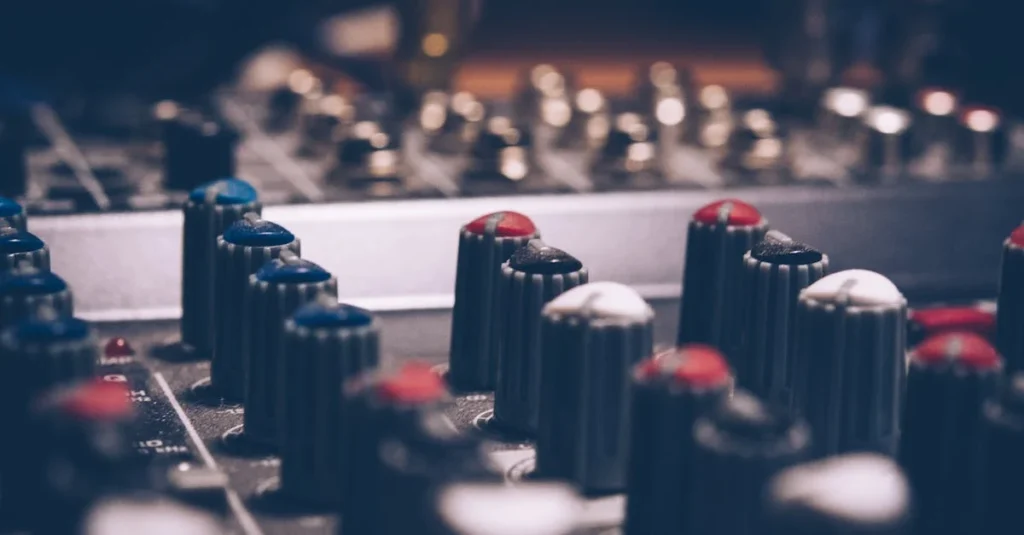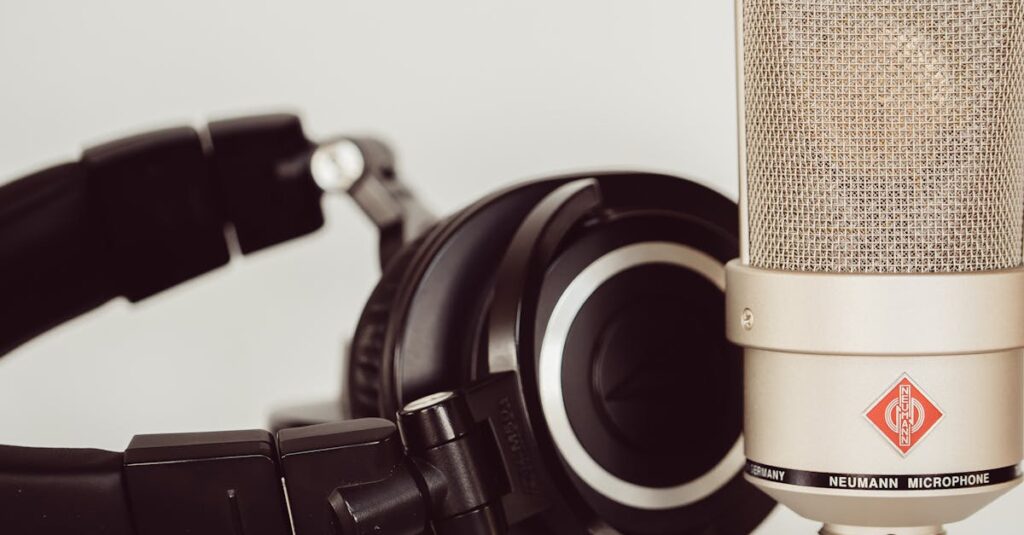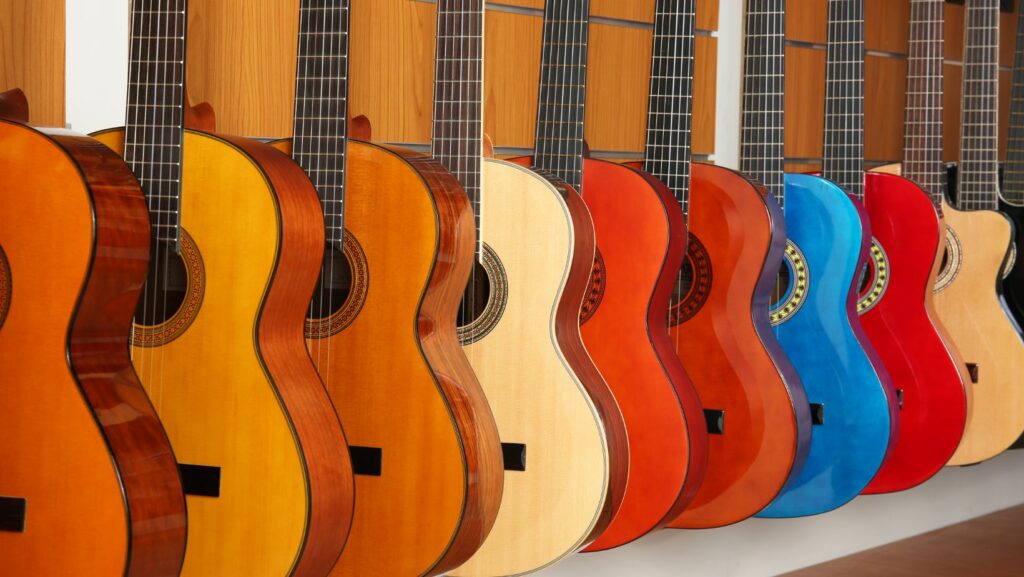In the ever-evolving world of music production, the right gear can make all the difference. Aspiring producers and seasoned professionals alike rely on a mix of hardware and software to bring their creative visions to life. With countless options available, selecting the best music production gear can be overwhelming yet exciting.
From powerful digital audio workstations (DAWs) to versatile MIDI controllers and high-quality microphones, each piece of equipment plays a crucial role in the production process. Understanding the essentials not only enhances workflow but also elevates the overall sound quality. Whether one is crafting beats at home or working in a professional studio, investing in the right tools is key to achieving that polished sound every artist dreams of.
Music Production Gear
Music production gear consists of essential tools that facilitate the creation of high-quality sound recordings. Various components play distinct roles in the music production process, each contributing to workflow efficiency and sound fidelity.
Digital Audio Workstations (DAWs)
 Digital audio workstations are software applications used for recording, editing, and producing audio files. Popular DAWs include:
Digital audio workstations are software applications used for recording, editing, and producing audio files. Popular DAWs include:
- Ableton Live: Known for its live performance capabilities.
- Logic Pro X: Preferred for its extensive plugin support.
- Pro Tools: Industry standard for professional recordings.
MIDI Controllers
MIDI controllers enable musicians to control software instruments and digital audio through physical interfaces. They come in various forms, including:
- Keyboard Controllers: Feature piano-style keys and various controls.
- Pad Controllers: Showcase drum pads for beat production.
- Control Surfaces: Provide tactile controls for mixing and editing.
Microphones
Microphones capture sound and play a crucial role in recording vocals and instruments. Different types include:
- Dynamic Microphones: Durable, great for live performances.
- Condenser Microphones: Sensitive, ideal for studio recordings.
- Ribbon Microphones: Warm sound, best for vocals and acoustic instruments.
Audio Interfaces
Audio interfaces convert analog signals to digital format, enabling seamless connection between instruments and computers. They vary in:
- Input and Output Count: Ranging from 2×2 to 32×32 channel configurations.
- Sample Rate and Bit Depth: Typically supporting 44.1 kHz to 192 kHz rates.
Studio Monitors and Headphones
Accurate sound monitoring is essential for music production. Studio monitors and headphones provide distinct listening experiences:
- Studio Monitors: Deliver flat frequency response, crucial for mixing and mastering.
- Closed-Back Headphones: Minimize sound leakage, suitable for tracking.
- Open-Back Headphones: Offer a natural sound, ideal for mixing.
Acoustic Treatment
Acoustic treatment enhances sound quality in a recording space. Key elements include:
- Acoustic Panels: Absorb sound reflections.
- Bass Traps: Control low-frequency buildup.
- Diffusers: Scatter sound energy for balanced acoustics.
Investing in quality music production gear enables producers to achieve professional results, whether working from home setups or fully equipped studios.
Essential Gear for Beginners
Beginners in music production require specific gear to set a solid foundation. Essential components improve workflow and sound quality, facilitating a smoother creative process.
Audio Interfaces
Audio interfaces serve as a crucial link between instruments, microphones, and a computer. They convert analog signals into digital signals, allowing for high-quality recordings. Most models provide multiple inputs for instruments and outputs for monitors. Popular beginner-friendly options include the Focusrite Scarlett series and PreSonus AudioBox. Both options offer ease of use and provide quality preamps to enhance sound capture.
MIDI Controllers
 MIDI controllers enable musicians to create and manipulate sounds in a digital audio workstation (DAW). Various types exist, including keyboard controllers, pad controllers, and control surfaces. Keyboard controllers, like the Akai MPK Mini, combine a keyboard with drum pads, making them versatile for composition and beat-making. Pad controllers, such as the Novation Launchpad, focus on triggering samples and loops for electronic music production. Selecting the right MIDI controller hinges on the user’s preferred style and workflow.
MIDI controllers enable musicians to create and manipulate sounds in a digital audio workstation (DAW). Various types exist, including keyboard controllers, pad controllers, and control surfaces. Keyboard controllers, like the Akai MPK Mini, combine a keyboard with drum pads, making them versatile for composition and beat-making. Pad controllers, such as the Novation Launchpad, focus on triggering samples and loops for electronic music production. Selecting the right MIDI controller hinges on the user’s preferred style and workflow.
Studio Monitors
Studio monitors provide accurate sound reproduction, which is essential for mixing and mastering tracks. These speakers are designed to deliver flat frequency response, allowing producers to hear their music as intended. Popular beginner models include the KRK Rokit and Yamaha HS series, known for their clarity and reliability. Investing in quality studio monitors enables producers to make informed mixing decisions, ensuring a polished final product.
Intermediate and Advanced Gear
Intermediate and advanced music producers often rely on high-quality gear to elevate their productions. Selecting the right equipment enhances creativity and achieves professional sound.
Digital Audio Workstations (DAWs)
DAWs serve as the backbone of music production, providing the platform for recording, editing, and mixing audio. Popular choices for intermediate and advanced users include Ableton Live, renowned for its loop-based composition, and Logic Pro X, ideal for comprehensive MIDI editing and seamless integration with Apple hardware. Pro Tools excels in professional studio environments, offering advanced editing tools and superior sound quality. Each DAW features distinctive capabilities that cater to specific workflows, enabling producers to refine their techniques efficiently.
Microphones
Microphones play a crucial role in capturing vocals and instruments accurately. For intermediate and advanced producers, options like the Shure SM7B dynamic microphone offer versatility in various recording settings. The Neumann U87, a classic condenser microphone, excels in studio environments, delivering exceptional clarity and warmth. Selecting the right microphone depends on the sound source, as different mic types, such as dynamic, condenser, and ribbon microphones, exhibit unique tonal characteristics tailored to distinct recording contexts.
MIDI Instruments
MIDI instruments enhance the music production process by allowing producers to compose and manipulate sounds digitally. Advanced MIDI controllers like the Native Instruments Komplete Kontrol series offer integration with software synths and virtual instruments, enabling expressive performances. The Arturia KeyLab range, featuring both keys and pads, provides diverse functionality for different production styles. These MIDI instruments facilitate greater control and creativity in music composition, making them essential tools for serious producers.
Accessories to Enhance Your Setup
Accessories play a crucial role in optimizing a music production setup. Each component contributes to overall performance and sound quality, ensuring a seamless production experience.
Cables and Adapters
Cables and adapters connect various pieces of gear, impacting signal flow and audio clarity. High-quality XLR cables are essential for microphones, ensuring optimal sound transmission without interference. TRS and TS cables facilitate connections between audio interfaces and monitors while balanced cables reduce noise. Adapters, such as 1/4″ to 1/8″ converters, increase compatibility among devices, streamlining setups. Investing in durable cables and reliable adapters enhances overall connection quality and minimizes disruptions during sessions.
Acoustic Treatment
Acoustic treatment significantly improves sound quality in any recording space. Acoustic panels absorb excess reverberation, reducing muddiness in recordings. Bass traps target low-frequency buildup, ensuring a more balanced sound. Diffusers scatter sound waves to maintain a lively acoustic environment without causing unwanted echoes. The combination of these elements leads to clearer monitoring and recording, allowing producers to make more informed decisions about their projects. Implementing proper treatment can transform a basic space into an effective music production environment.
Software Plugins
Software plugins expand the capabilities of digital audio workstations (DAWs), adding essential effects and instruments. Equalizers (EQ) allow for precise frequency adjustments while compressors manage dynamic range, enhancing overall mix quality. Reverb and delay plugins create depth and space in tracks, contributing to an immersive listening experience. Virtual instruments, such as synthesizers and samplers, introduce new sounds and textures to productions. Utilizing a variety of software plugins elevates creativity and efficiency, making it an indispensable part of any producer’s toolkit.
Prioritizing Essential Gear
Choosing the right music production gear is vital for anyone looking to create high-quality sound. Each piece of equipment plays a unique role in the production process and can significantly impact the final outcome.
Investing in quality tools not only enhances workflow but also elevates sound quality. Whether it’s a beginner starting with a simple setup or an experienced producer upgrading to advanced gear, the right equipment can make all the difference.
With the right combination of DAWs, MIDI controllers, microphones, and accessories, anyone can achieve professional results. Prioritizing essential gear and understanding its impact will ultimately lead to a more satisfying and productive music production experience.



